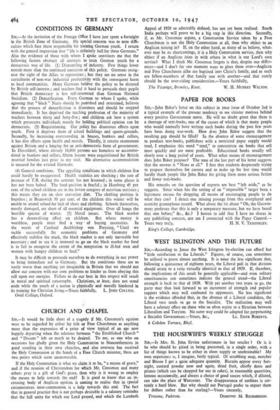PAPER FOR BOOKS Sta,—John Baker's letter on this subject in
your issue of October 3rd is a typical example of the present tendency to see sinister motives behind every positive Government move. He will no doubt grant that there is a shortage of tett-books, one of the causes of which is that many people who would normally have written such books during the past few years have been doing war-work. How does John Baker suggest that the resulting gap should be filled? In the absence of some encouragement to produce text-books, publishers with a restricted paper supply would tend, I emphasise this word "tend," to concentrate on books that sell most quickly and are most profitable. Educational books usually sell slowly over a long period of years. What other means of encouragement does John Baker propose? The tone of the last part of his letter suggests that the answer is "None at all." I fear that students desperately trying to prepare themselves for careers and to make up for lost time would hardly thank people like John Baker for giving them more serious fiction and fewer text-books.
His remarks on the question of exports are best "left aside," as he suggests. Since when has the setting of an "impossible" target been a legitimate excuse for dropping all means of encouraging people to do what they can? I detect one missing passage from this overplayed and scratchy gramophone record. What about the bit about "Oh, the Govern- ment professes that this is only a temporary measure, lnit we have heard that one before," &c., &c.? I hasten to add that I have no shares in any publishing concern, nor am I connected with the Paper Control.—
King's College, Cambridge.


































 Previous page
Previous page